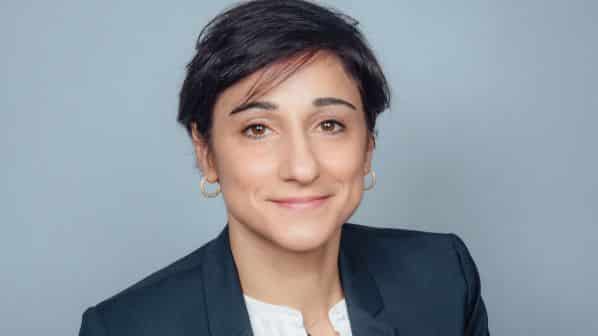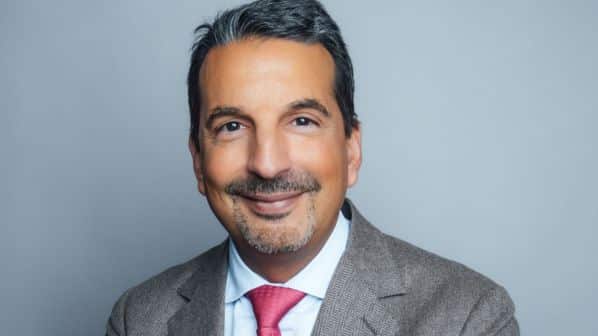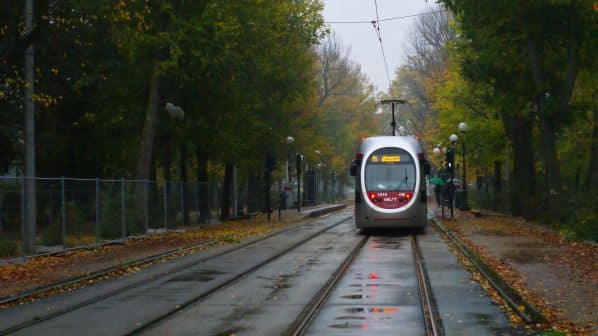EMERGING from the Covid-19 pandemic, RATP Dev suffered “a massive shock,” according to its CEO, Ms Hiba Farès. “Our profit and loss is mostly about labour and energy, we had all that inflation that hit us very, very badly,” she says. Coupled with rising costs was an unprecedented shortage of drivers and maintenance staff in the major cities of developed countries, the like of which “we had never seen in our industry before.”
“We had many challenges to tackle at the same time and I don’t think we’d ever had such a concentration of challenges before,” Farès says. “At RATP Dev we are now really tightly focused on running our current business, running our current contracts, which means how to cover inflation, how to hire, how to train, how to retain. It is back to basics.”
Concentrating on the basics of running an urban transport network, or a metro, commuter or light rail line, does not mean that innovation is neglected, and RATP Dev is looking to digital tools to streamline its businesses processes and make sure managers are in face-to-face contact with staff on the front line. “We are also digitising very, very fast all our HR processes in order to hire in two days,” Farès says. “Before it sometimes used to take two to six months. We have a new system in place. With two clicks, a future employee can register his or her interest and we can respond very quickly. This has been deployed all over the globe, because we’re in 15 countries, so it was a big job to roll out this system in all these languages.”
Efforts to improve staff skills have seen new training centres opened in Italy, where RATP Dev operates the light rail network in Florence, in Saudi Arabia where it will operate the automated Riyadh Metro, and in Egypt, where it operates and maintains Line 3 of the Cairo Metro.
“Our digital strategy is all about empowering [our people] to be on the ground more often and spending less time on administrative tasks.”
Ms Hiba Farès, RATP Dev CEO
To retain staff, Farès sees focused day-to-day management as the key, ensuring that there are enough managers on the ground with time to get out of the office for face-to-face contact with frontline staff. Despite constant pressure on costs, both from authorities awarding contracts and wider, external factors such as inflation and the rise in energy prices, “we absolutely support our middle management teams, the managers who are on the ground, talking to drivers, talking to maintenance staff,” Farès says.
“Middle management should not be about Excel spreadsheets but about spending time in the field,” Farès believes. “Our digital strategy is all about empowering them to be on the ground more often and spending less time on administrative tasks.” One example is a digital tool making it easier for drivers to swap their shifts at short notice should they need to. “We are deploying all these tools, techniques, new ways of doing things, in order to leave time for real contact, real human interaction, real sharing of knowledge, especially when you first join a company,” Farès says.
RATP Dev also believes that diversity has a major role to play in its future success, promoting public transport “very loudly” as a career for women and adapting staffing rosters to suit a more diverse workforce. “We know that a lot of people won’t work from 05.00 to 17.00 five days in a row, even with long interruptions during the day, so we have to be more flexible about this,” Farès says. “We want to have a very diverse workforce. So we are really very proactive about attracting women to be metro drivers, train drivers and maintenance personnel. We’re doing it everywhere, whether we have a staff shortage or not.”
“This whole industry used to operate on the premise that drivers would always be found,” says Mr Mehdi Sinaceur, RATP Dev deputy CEO and executive vice-president for its International business unit. “That is clearly no longer the case. We have to make an effort to attract more young people.” Farès adds: “everybody is facing a shortage and so we are all in competition. We should be attractive to young people in terms of flexibility, salary, working conditions, the balance between personal and professional life.”
Bidding strategy
Turning to how RATP Dev plans to grow its business, Sinaceur says that the company is following a two-pronged approach, the first being to reinforce its established presence in France and the United States by winning new contracts.
“Our biggest target in France now is Lyon,” says Farès, noting that the public transport authority of the second-largest city after Paris is “very serious” about introducing competition by putting operating contracts out to tender. One will cover the bus network and the other Lyon’s metro and light rail lines, and Farès reports that RATP Dev is tightly focused on bidding for both. “What is really attractive for us is that Lyon is trying to automate some metro lines and is talking about rolling stock renewal. They have extension projects, so all the know-how of our core business has a real live application there,” she says.
The knowledge and experience gained by RATP Group’s core business in Paris, notably in building and operating the driverless metro Line 14 and in converting lines 1 and 4 to automatic operation, will be deployed in the second prong of its approach to winning new business, which Sinaceur describes as “a focused effort to tackle all large and complex urban rail projects all over the world.” One side to this is targeting new metro lines being built for operation at Grade of Automation 4 (GoA4).

“We are in the middle of a very heavy new phase where we are tackling all the significant GoA4 projects that are happening around the world,” Sinaceur says. “It’s a huge wave. We have as many greenfield projects around the world in the next five years as we’ve had in the past 10 to 15 years put together. There were times in the past where you would have a new metro line every three to four years. Today we have three to four live bids at the same time.”
Among future prospects, Farès notes the MetroLink project to build an 18.8km driverless metro in Dublin, as well as planned new lines in Sydney and Melbourne. “We are currently bidding on two lines in Singapore,” she adds, working here with local partner ComfortDelGro, which joined RATP Dev and Alstom in the ORA Consortium to win the contract to operate Line 15 South of the GoA4 Grand Paris Express network. “Singapore is for me really one of the best networks in the world, so if we succeed in wining one or two lines there, it’s going to be a major showcase for us,” Farès says.
Sinaceur points out that RATP Dev is often involved in the design of new-build GoA4 metro projects from the outset, working with consortium partners that may include architectural practices, civil engineering contractors and suppliers of rolling stock, signalling and other railway systems. “In order to operate well, you need to make sure that the design is completely functional,” he says. Here, the company can draw on the experience of its parent RATP Group.
This knowledge, and RATP Group’s experience of upgrading the sections of RER lines A and B that it operates in Paris, is also put to use in the second strand of RATP Dev’s bidding strategy, focusing on what Sinaceur describes as brownfield commuter projects. “They are complex in the breadth of work that is involved,” he says. “If you have a legacy network with varied rolling stock, signalling technology and infrastructure of differing ages, and you need to integrate all that to create or maintain seamless service and modernise it, then again, you’ll find the typical kind of complexity that RATP Group is best at.”
Best practice
Sinaceur is concise when describing RATP Dev’s role in disseminating best practice in the field of metro and commuter automation. “It’s very simple,” he says.
“We are the bridgehead of the RATP Group to disseminate this knowledge internationally and in France,” taking as an example the Sydney Metro Western Sydney Airport Line. “We have 20 engineers on the ground and more than half of them come from the heart of the RATP Group. And in Paris, both at RATP Dev and within the RATP Group, we have 10 other people supporting the project. Anything from station design to energy management, passenger information and rolling stock refurbishment, all of the expertise of the RATP Group can be called in.” As with Siemens in the case of Sydney, RATP Dev also has a very close relationship with original equipment manufacturers, including Alstom and Hitachi. “The level of technical exchange is very high,” Sinaceur says.

In the reverse direction, experienced gained abroad should be put to good use in Paris later this year when the city hosts the Olympic and Paralympic Games. RATP Dev is expecting to draw on its experience of crowd management for major events as the operator of the metro and light rail networks in Doha. Over 18 million football fans used these services when Qatar hosted the Fifa World Cup in 2022, with a record 860,000 passengers carried in just one day. A team of 70 specialists was deployed from RATP Group to help with crowd management and managing the network as traffic grew to 10 times its normal level.
“We have as many greenfield projects around the world in the next five years as we’ve had in the past 10 to 15 years put together.”
Mehdi Sinaceur
“These people will now bring what they’ve seen in Qatar to Paris,” says Farès, noting the exceptional nature of the 2022 World Cup with all eight stadia located in the same city. “In the early stages of the competition you had four matches a day,” she notes. “The connection from the station to the stadium is the critical part.” RATP Dev worked closely with its partners and its client, Qatar Rail, as well as the stadium operators and the police to plan every detail of the operation, such as providing big screens to keep fans entertained as they waited to board trains.
Sharing best practice is not limited to specific projects or a particular discipline, and the movement of staff between domestic and international assignments ensures that RATP Dev has a wide and varied pool of knowledge to draw on. “We’re always sharing, we always keep learning from one another,” Farès says. “All the people who will have careers in Paris and then abroad, or abroad and then in Paris, it’s an indirect way of sharing know-how and experience.”
Should a project require expertise beyond RATP Dev’s core urban skillset, such as High Frequency Rail (HFR) to provide more intensive passenger services between the major cities of eastern Canada, RATP Dev is willing to join with more qualified partners. While RATP Dev could provide expertise in aspects of this project such as shorter-distance services, better connections with other modes, station management, ticketing and customer service, it will be looking to its consortium partners Renfe Operadora and FirstGroup to contribute their experience of operating mainline or high-speed services and maintaining rolling stock for long-distance duties. “We’re not going in alone,” Sinaceur says. “We have a very full team that represents the range of skills that are going to be needed. Everyone will do what they’re best at.”
French regional market
Closer to home and to RATP Dev’s core expertise are the contracts now being tendered to operate TER regional services that up until now have been the exclusive preserve of French National Railways (SNCF).
“The French market is starting very, very slowly to open up to competition,” Farès says. “We are ready to be a new operator of TER services in France, but we are starting to look at every region, their policies and tenders, with a lot of willingness to be part of this adventure but also prudence.” RATP Dev submitted a full bid for a contract tendered by the Pays de la Loire region but was not successful. “We were among the three competitors that were shortlisted, but we weren’t selected,” Farès reports. “This was our first bid and so that is fully understandable.”
“What we see from the market is that we have had five tenders so far in France and only one has escaped from the hands of the incumbent. The regions are slowly getting ready to welcome new players.” With bidding representing a substantial investment in time and money, Farès says that RATP Dev is working with regions preparing tenders to make them understand that a full, open competition requires a level playing field for the incumbent and potential new entrants, especially when it comes to the time allowed for new bidders to mobilise and have all the necessary resources in place to operate the services in question.
“The incumbent doesn’t need a pre-mobilisation period,” Farès points out. “New entrants need to meet with the unions and may need time to recruit and train drivers. In Germany, this was the biggest problem for new entrants. DB had all the drivers and the others were struggling to find drivers.” Some contribution to bidding costs would also indicate how serious the region is about market opening. “In many countries, in order to attract competition, you pay part of the bidding costs,” Farès says.
Forthcoming tenders are expected from regions such as Bourgogne, Franche-Comté and Normandie, Farès reports. “If the bids we are now seeing, that we are discussing with the regions, if they are only about operation and maintenance, I don’t think we would need partners,” she says. “We don’t have a fixed consortium with whom we bid, if it’s only for a PSO contract then it’s our normal job.” Partners would be sought from the civil engineering sector if the tender had a major infrastructure element, such as the contract awarded by the Grand Est region to a consortium of Transdev and NGE, covering infrastructure management and operations on the 60km Nancy - Contrexéville line which has been closed since 2016.
“We don’t need to add complexity where we don’t need it,” Farès says. “But when we need the right partners that could bring value to our client or to the end customer, we’re really happy to do it.”

